
- General information
- Geographical position
- Administrative and territorial structure
- Population
- National symbols
- Tourism
- Visa Requirements
- Customs restrictions
- Currency
- Time zone
- Climate
- Capital: ASTANA
- Branches of government
- Politics
- Bilateral Relations
- Economy
- Business and Opportunties
- Science
- Transport
- Religion
- Network and communications
- Useful links
- Newsletters
General information
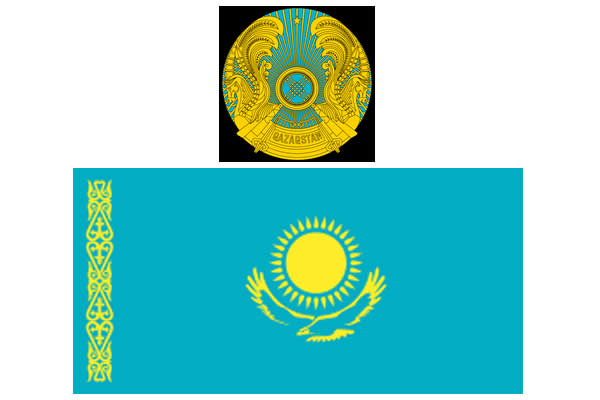
Embassy of Kazakhstan in Brazil
Address: Setor de Habitações Individuais Sul – SHIS, QL 24, Casa 20, Lago Sul, Brasília – DF, Brasil, CEP 71665-075
Telephone: (61) 3879-4602
Ambassador: H.E. Mr. Bolat Nussupov
- Official name: Republic of Kazakhstan
- Capital of the Republic of Kazakhstan: Astana
- President: Kassym-Jomart Kemeluly Tokayev
- Region: Asia (Central Asia)
- Territory: 2,724,900 km²
- Population: 20 mln people
- Independence day: December 16, 1991 (from USSR)
- Administrative divisions: unitarian state, administratively consisting of 20 territorial unit: 17 regions and 3 cities of republican significance
- Government control: Presidential republic
- Head of State: President elected for 7 years
- Top lawmaking body: Two-chamber parliament (Senate and Mazhilis)
- Supreme executive organ: Government of the Republic of Kazakhstan
- Currency: Kazakhstani tenge (KZT)
- ISO code: KAZ
- Web domain: .KZ
The Republic of Kazakhstan is a unitary state with the presidential system of government. Under the Constitution, Kazakhstan is a democratic, secular, legal and social state which recognizes the man, his life, rights and freedoms as the supreme values of the country.
Kazakhstan gained independence on December 16, 1991. Astana is the capital city of the country. Kazakh language is the official language of Kazakhstan. The Russian language has the status of the language of interethnic communication. The unit of currency used in Kazakhstan is tenge.
Geographical position
The Republic of Kazakhstan occupies a very advantageous geographical position being in the central part of the Eurasian continent at an equal distance from the Atlantic and Pacific oceans. The country area is 2724.9 thousand km². The indicator is ninth in the world and fourth among the countries of Eurasia.
Administrative and territorial structure
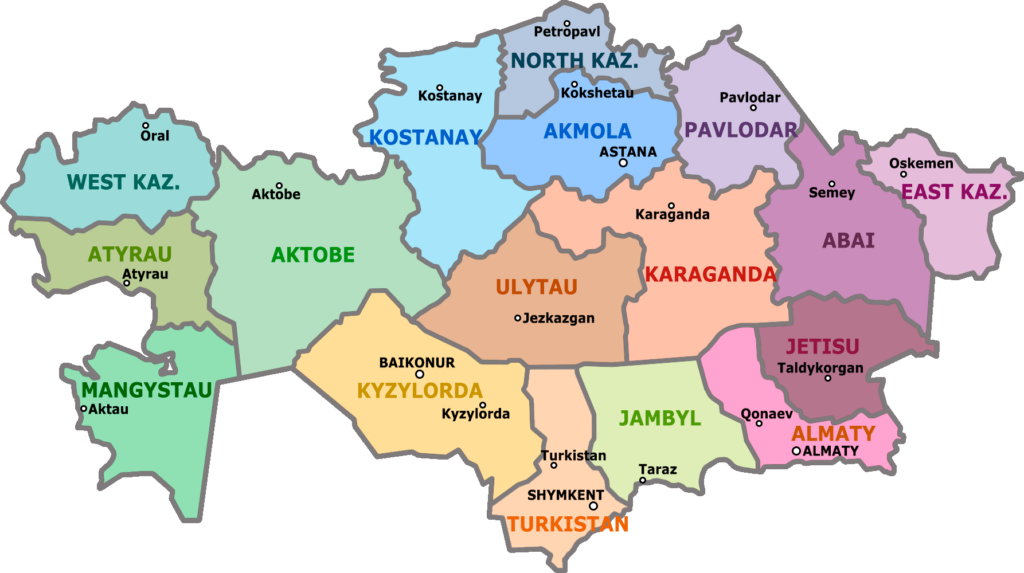
The administrative and territorial structure of the country includes 17 regions and 3 cities of republican significance.
The population of Kazakhstan is a little over 20 million people.
With the territory of 2 million 724.9 thousand square kilometers, the country is ninth in the world in terms of area. In the north and west, the republic has shared borders with Russia: 7.591 km (the longest uninterrupted land border in the world), in the east with China: 1.783 km, in the south with Kyrgyzstan: 1.242 km, Uzbekistan: 2.351 km and Turkmenistan: 426 km. The total length of the land borders is 13.200 km.
Kazakhstan is the largest country in the world that does not have direct access to the World Ocean. Most of the country’s territory is deserts – 44% and semi-deserts – 14%. Steppes occupy 26% of the area of Kazakhstan, forests – 5.5%. There are 8.5 thousand rivers in the country. The northeastern part of the Caspian Sea is included in the republic borders. The Aral Sea is divided between Kazakhstan and Uzbekistan. There are 48 thousand large and small lakes in Kazakhstan. The largest of them are Balkhash, Zaysan and Alakol. The remoteness from the oceans determines the sharply continental climate of the country.
Population

The total population of Kazakhstan exceeds 20,000,000 people. The Republic of Kazakhstan today is a state with a multi—ethnic composition of the population. According to 2023, Kazakhs make up the majority of the population – 70.6%, the share of the Russian population – 15.1%, Uzbeks – 3.2%, Ukrainians – 1.9%, Uighurs – 1.5%, Germans – 1.1%, Tatars – 1.1%, Azerbaijanis – 0.7%, Koreans – 0.6% and other nationalities.
The largest number of Kazakhs is noted in Turkestan region – 1.5 million, the majority of Russians from their total number live in Almaty – 428 thousand, Uzbeks – in Turkestan region – 378 thousand people, Ukrainians – in Kostanay region – 86 thousand, of 297 thousand Uighurs, the majority live in Almaty region – 120 thousand people.
National symbols
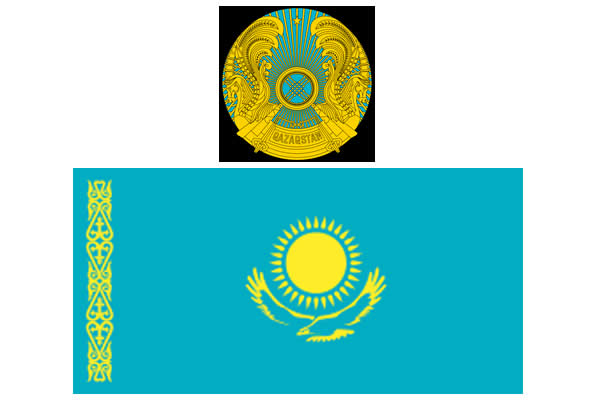
In the Republic of Kazakhstan the state symbols are the State flag, the State Emblem and the National anthem.
Tourism

The unique nature of Kazakhstan startles. It dazzles a traveler with the grandeur of vast steppes and gold domes of mosques, blue surface of Lake Balkhash and modern buildings of Astana. The cities of the Great Silk Road and the Baikonur cosmodrome, all those represent Kazakhstan. Occupying an advantageous geographical position and being in the center of the Eurasian continent, the nature of the country is a symbiosis that has absorbed the brightest nature features from both parts of the continent.
For one part, there are rapidly developing cities with modern buildings, on the other part there is the pristine nature of Kazakhstan, deserts, ancient cities and beautiful alpine-like sceneries. Here you can get acquainted with “yurts” (houses of nomads), drink “kumys” (mare’s milk), taste amazing dishes of national cuisine, breathe in the healing air, and contemplate an outstandingly beautiful mountain landscapes. For example, the high mountain cluster of Kazakhstan can be called one of the most fascinating ones.
Due to the coronavirus pandemic, domestic tourism is developing more rapidly in Kazakhstan, which resulted in opening of new locations and facilities. Regardless of attraction to outdoor activities, mountain routes, horseback riding tours and ancient historical sites, resort vacations will always be the most popular and demanded among tourists.
Nature is pretty much the main reason of travelers` interest in our country, though the architectural heritage also attracts a lot of attention.
Throughout the world, ecotourism is most actively developing near designated conservation areas: national parks and reserves. This is how the oases of wild nature are left untouched by civilization and even if any human activity is allowed it is strictly regulated.
Needless to say that Kazakhstan has a great number of unique conservation areas.
Thus, in the article, we describe a dozen unique places in Kazakhstan that look just as at the paintings of great artists. There you can take stunningly beautiful photos, so if you have a camera you certainly should use it during a trip.
Solo travelling is a new tourism trend resulting from the global pandemic. And Kazakhstan, considering its vast territory, low population density and an abundance of natural parks, is a unique place for solo travels when social distancing will be something unobtrusive and natural.
Visa Requirements
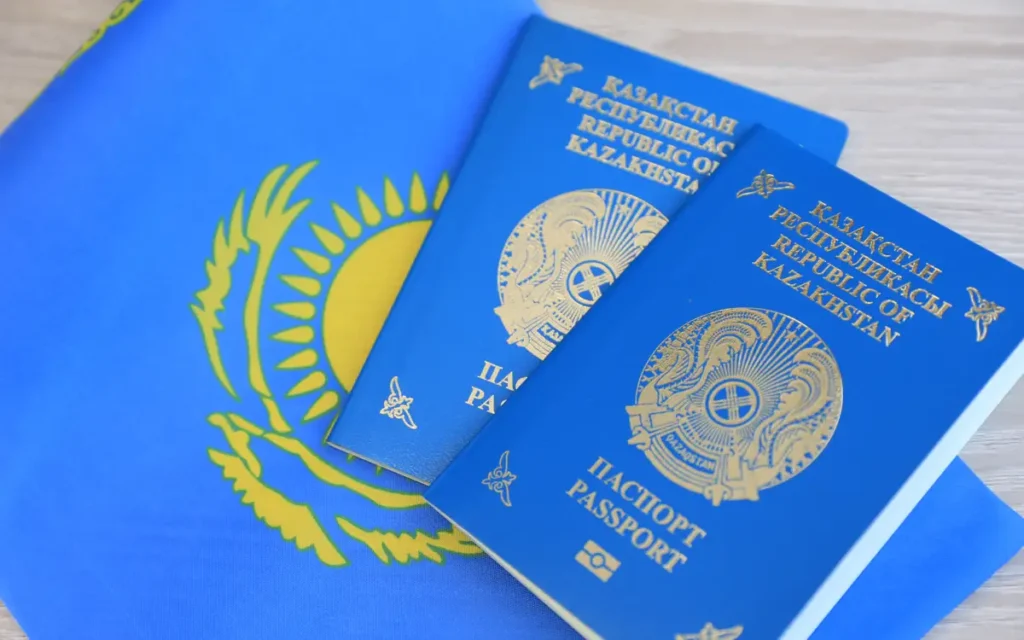
Consular and visa issues
ISSUANCE, EXTENSION OF ENTRY AND TRANSIT VISAS THROUGH THE REPUBLIC OF KAZAKHSTAN TERRITORY
The state service is provided by the Ministry of Foreign Affairs and foreign institutions of the Republic of Kazakhstan.
The Consular Section of the Embassy of Kazakhstan in the Embassy of the Republic of Kazakhstan in the Federative Republic of Brazil resumes limited operation starting from 1 June 2020.
Please note that certain restrictions will be in place due to the ongoing coronavirus pandemic. In particular, social distancing will be maintained and the number of simultaneous visits will be limited.
Please take note that due to ongoing restrictions on travel to and from Kazakhstan, Kazakh visas will only be issued to a few categories of foreign citizens who are allowed to enter the Republic of Kazakhstan for the period of pandemic (diplomats, members of official delegations, family members of Kazakh citizens, crew members of aircraft and ships, employees of Kazakhstan airlines, etc., more information can be found here.
Office hours of the consular section:
Hours of Operation for each Consular Section: 09:00 – 18:30 M-Tu-Th-Fr.
Sections are closed on Wednesday.
Reception of documents is from 09.30 a.m. to 12.30 p.m.
Issuance of documents from 16.00 p.m. to 17.00 p.m.
Phone counselling at +55 61 3879 4603 from 15.00 p.m. to 16.00 p.m.
THERE IS NO NEED TO MAKE AN APPOINTMENT.
*When visiting the Consular Section, please observe hygiene rules and use mask/gloves.
For questions about consular services / list of documents, please send your requests by e-mail: consulkz.brazil@mfa.kz
Public holidays of the Republic of Kazakhstan:
If the weekend and holidays coincide, then the first working day after theweekendis holiday.
Official state and national holidays of the Republic of Kazakhstan:
January 1, 2 – New Year
January 7 – Christmas Day
March 8 – International Women’s Day
March 21, 22, 23 – National holiday “Nauryz”
May 1 – Day of Unity of the People of Kazakhstan
May 7 – Defender of the Fatherland Day
May 9 – State holiday Victory Day
July 6 – State holiday Capital Day
August 30 – State holiday Constitution Day
December 1 – Day of the First President of the Republic of Kazakhstan
December 16 – National holiday Independence Day
The first day of Kurban-ayt, marked on the Muslim calendar, is a day off.
LIST OF DOCUMENTS FOR OBTAINING VISAS OF THE REPUBLIC OF KAZAKHSTAN
To obtain a visa to enter the Republic of Kazakhstan, you must provide:
1) visa application form with a 3.5cm x 4.5cm size colour or black and white photo;
2) when applying for a visa at a foreign institution of the Republic of Kazakhstan or the Ministry of Foreign Affairs of the Republic of Kazakhstan, the number, date of the invitation registered with the Ministry of Internal Affairs of the Republic of Kazakhstan or the Ministry of Foreign Affairs of the Republic of Kazakhstan (the number and date of issue of the invitation to the visa recipient is reported by the inviting party), or the request of the recipient of the visa category;
3) a valid diplomatic, service, foreign passport of a foreign state, or other identity document recognised as such by the Republic of Kazakhstan and granting the right to cross the State Border of the Republic of Kazakhstan;
4) receipt confirming payment of consular fee in original;
The amounts of the paid consular fee are not subject to refund (in accordance with paragraph 7 of Article 629 of the tax code of the Republic of Kazakhstan dated 25.12.2017 No. 120-VI of the tax code).
5) additional documents required to obtain a visa according to the visa category ( Appendix 1 to the Rules).
PROCESSING TIME OF PUBLIC SERVICES
From the moment of submission of the package of documents to the service provider – not more than 5 (five) working days.
When applying on the portal – 1 (one) working day.
CONSULAR FEE
Amount –
– single entry visa (except for tourist and transit visas) – 80 USD;
– multiple entry visa (except for tourist and transit visas) – 200 USD;
– tourist visa: single entry – 60 USD;
– tourist visa: multiple entry – 90 USD;
– transit visa: single entry – 20 USD;
– transit visa: multiple entry – 90 USD.
WORKING HOURS OF THE CONSULAR SECTION
Daily (except Wednesdays, Saturdays and Sundays, as well as public holidays) from 09.30 to 12.30 pm
IN CASE OF QUESTIONS ABOUT THE LIST OF DOCUMENTS
Please contact the hotline number: +55(61)998009618 and/or e-mail: consulkz.brazil@mfa.kz
“Smart Travel KZ” mobile application for Kazakhstan’s tourists
Ministry of Foreign Affairs of the Republic of Kazakhstan has launched the mobile application entitled “Smart Travel KZ” for citizens of traveling or living abroad.
The main goal of this application is to ensure the safety of the Kazakhstan citizens abroad, as well as providing them prompt assistance and help when needed.
Smart Travel KZ application contains broad and extensive information about countries, its peculiarities, norms of behavior, as well as recommendations on actions in hazardous situations, emergency warnings and other necessary information for citizens who are abroad.
Application also provides information on visa regimes and order of stay in a foreign country, as well as general information on the visa-free regime for citizens of Kazakhstan. Additionally, the mobile application can find data on prohibited or restricted items for import and export, the rules of duty-free import and export, veterinary and phytosanitary control etc.
Form
⇓

VISA APPLICATION FORM: CLICK HERE TO DOWNLOAD
Customs restrictions

Kazakhstan is part of the Eurasian Economic Union (EAEU). This means that on the territory of our country the same rules for transporting various goods across the border apply as in other countries of the Customs Union.
Natural persons may import tobacco and tobacco products: 200 cigarettes, or 50 cigars, or 200 products with heated tobacco (“sticks”), or 250 grams of tobacco not exceeding the amount equivalent to 10,000 euros and weighing no more than 50 kg in accompanied and unaccompanied baggage by air into the territory of the Eurasian Economic Union.
As of today, the threshold for duty-free import of goods for personal use delivered by carrier, road, rail, water transport or on foot has been extended until April 1, 2024. Thus, there is a permit for natural persons to import tobacco and tobacco products: 200 cigarettes, or 50 cigars, or 200 heated tobacco products (“sticks”), or 250 g of tobacco, not exceeding an amount equivalent to 1000 euros and weighing not more than 31 kg up to April 1, 2024, respectively.
It is also permitted to import alcoholic beverages with an alcohol concentration of more than 0.5%, imported in accompanied and unaccompanied baggage of no more than 3 liters per one natural person.
Today, there is restriction to export cash foreign currency and monetary instruments in foreign currency in the amount exceeding the equivalent of 10,000 US dollars, calculated at the rate of the National Bank of the Republic of Kazakhstan established on the date of export. Thus, there is a permit for each natural person to export cash in foreign currency not exceeding the equivalent of 10,000 US dollars.
Currency
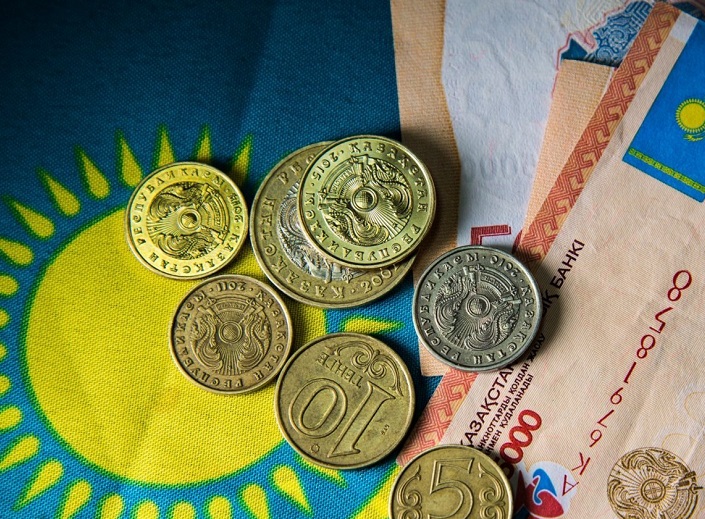
The national currency of Kazakhstan is Kazakhstani tenge. The currency put into circulation on November 15, 1993. It is the day of the national currency introduction into circulation that was declared the National Currency Day. November 15th is also a professional holiday for employees of the financial system of the Republic of Kazakhstan.
The national currency has its symbol (〒).
The most profitable currency conversion is in official exchange offices and banks. In Kazakhstan, credit cards are accepted almost everywhere. Recently, non-cash payments have become widespread in the country. In each city of the country, one can pay using popular applications and QR codes or wire transfer money. Cashless payment for any vehicle (air, taxi, urban transport) is also possible. Shopping, ordering food, paying bills, all those can be done online, one just needs to have a smartphone with an application installed to carry out financial transactions or have a card to be used with a portable POS terminal.
Time zone
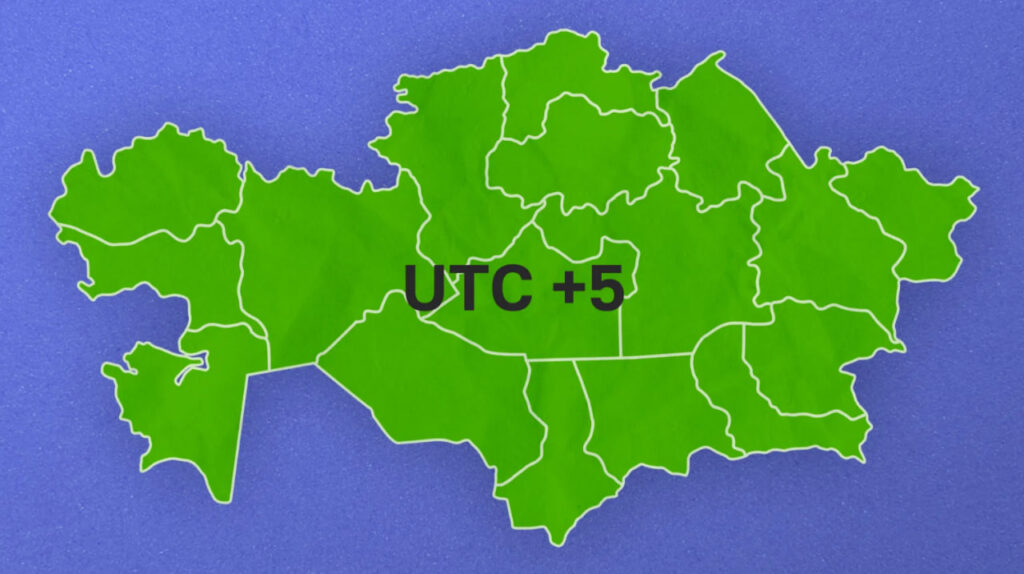
From March 1, 2024, the entire territory of Kazakhstan will be located in the 5th time zone (UTC+5).
Climate
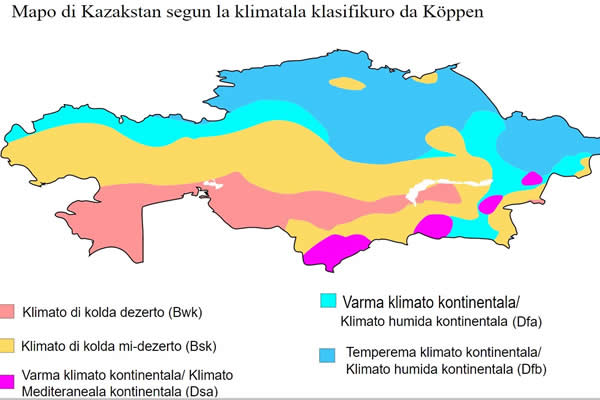
The climate of Kazakhstan is sharply continental, i.e. with cold winters and hot summers. The weather can vary significantly in different regions of the country due to spatial features. When spring sowing is taking place in the far south of the country, snow can still lie or blizzards can rage in the north.
In winter, the average temperature in the north reaches -18.7 °C in January, while in the south it is -1.5 °C. Snowy winters are ideal for winter sporting activities in places like ski resorts. One of the most popular ski resorts is Shymbulak ski resort in Almaty.
In summer, the average temperature of the hottest month, July, in the north of the country is + 18.8 ° С, while in the south it goes up to + 28.8 ° С. During a hot summer, a favorite type of recreation for Kazakhstani citizens is beach holiday on the picturesque shores of seas and lakes as well as in various recreational centers.
Kazakhstan is a sunny country. Thus, in some regions the sun shines up to 330 days a year and the sky is almost always deep blue.
The capital of Kazakhstan is Astana:
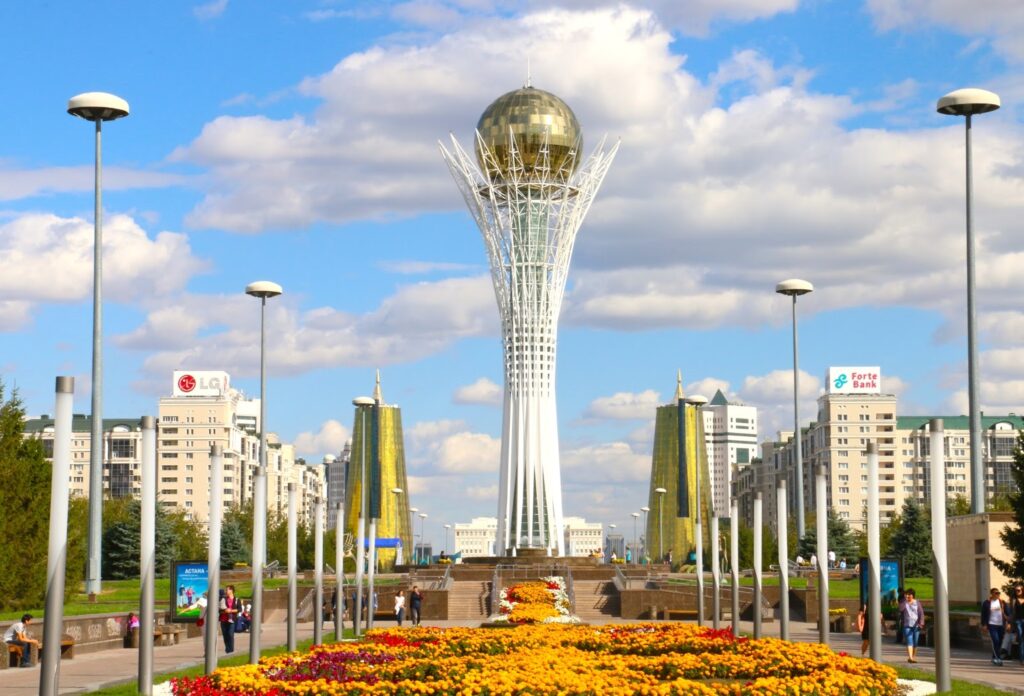
Astana is the capital of Kazakhstan and until 1998 it was known as Aqmola. In 2019 it was renamed Nur-Sultan but in 2022 it was renamed Astana by presidential decree.
The city is located along the Ishim River in the center of the country. Its population is one million inhabitants, making it the second largest urban agglomeration in the country after the city of Almati.
Located in a very flat, semi-arid steppe region (like most of the country), Astana covers 722 square kilometers and has an elevation of 347 meters above sea level. The city’s climate, in general, is humid continental and has an average annual temperature of 3.5º Celsius. This is due to the harsh winters in which the temperature in January reaches an average of -14.2 Celsius. This temperature gave Astana the title of second coldest capital in the world, after Ulan Bator, in Mongolia.
Astana is a planned city, just like Brasília, in Brazil; Canberra, in Australia and Washington, DC, in the United States. The city’s master plan was designed by Japanese architect Kisho Kurokawa. The city has many futuristic buildings, hotels and skyscrapers, as well as being home to the parliament, the supreme court, the presidential palace and several government departments and agencies.
The role of capital gave a powerful impetus to the economic development of Astana. The city’s high rate of economic growth has attracted numerous investors. Since becoming the capital, the volume of investment has increased almost 30 times, the gross domestic product (GDP) has increased ninety times and industrial production has increased eleven times. The city’s GDP represents about 8.5 percent of the country’s GDP.
The Astana New Special Economic Zone was established in 2001 to develop industry and increase the city’s attractiveness to investors. The site has hosted factories, a fast food complex, temporary warehouses and a business center, as well as a furniture factory and the production of civil and military engineering machines.
The Astana administration is promoting the development of small and medium-sized businesses through the cooperation of the city’s Sovereign Fund and the National Economic Chamber. Support is provided by a special credit program. As a result, the number of small and medium-sized companies has increased considerably. Consequently, the number of people employed in small and medium-sized companies has also been increasing year after year.
Branches of government
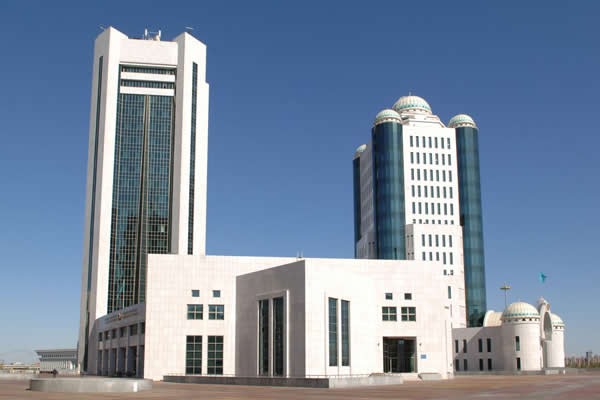
The President of the Republic of Kazakhstan is the head of state, the highest official, who determines the main directions of domestic and foreign policy of the state and represents Kazakhstan both inside and outside the country. The President is a symbol and guarantor of the national unity and state power, inviolability of the Constitution, human and civil rights and freedoms.
The government exercises executive power, heads the system of executive bodies and manages their activities.
Legislative functions are performed by the Parliament, which consists of two Chambers – the Senate and the Mazhilis, acting on a permanent basis.
The Senate is formed by deputies representing, in accordance with the procedure established by the constitutional law, two people from each region, city of republican significance and the capital of the Republic of Kazakhstan. Ten deputies of the Senate are appointed by the President of the Republic, five of whom are appointed on the proposal of the Assembly of People of Kazakhstan.
The Mazhilis consists of ninety-eight deputies elected in accordance with the procedure established by the constitutional law under the mixed electoral system: according to the system of proportional representation in the territory of a single national electoral district, as well as in single-mandate territorial electoral districts.
Politics

Being the Central Asia leader, the country makes a significant contribution to strengthening the stability of the region. The country has made a great progress in the world stage. This is proved by the chairmanship of Kazakhstan in the OSCE and holding of the Summit for this international organization in December 2010 in Astana. A significant initiative introduced by the country was the launch and development of the CICMA project, which is the Asian analogue of the OSCE. The productive activity of Kazakhstan as being the chairman of the leading organization of the Islamic world (OIC) received positive feedback. The country is also a recognized leader in the global anti-nuclear movement.
Kazakhstan is a member of the Eurasian Economic Union.
Stable growth of all the economy sectors, international recognition and political stability have become the basis for the prosperity of Kazakhstani society. Kazakhstan is the country looking ahead, which at the same time preserves its cultural traditions and successfully implements its huge potential in today’s accelerating world.
Economy

The mineral resources base of the country consists of more than 5 thousand deposits. The forecasted cost of the deposits is estimated at tens of trillions of dollars. The country is on the first position in the world in terms of explored reserves of zinc, wolframium and barytes, second position in silver, lead and chromite, third in copper and fluorite, fourth in molybdenum, and sixth in gold.
Also, Kazakhstan has significant oil and gas resources (ninth in the world in terms of explored oil reserves) concentrated in the western regions. Moreover, the country ranks eighth in coal reserves and second in uranium reserves.
Kazakhstan is one of the ten leading world exporters of grain and one of the leaders in flour export. Seventy percent of arable lands in the north are occupied by grain and industrial crops such as wheat, barley, millet. Rice, cotton and tobacco are grown in the south of the country. Kazakhstan is also famous for its gardens, vineyards and cucurbits. One of the leading areas of agriculture is animal-breeding.
The main export commodities are products of mining, fuel and energy, metallurgical and chemical industries, as well as the grain industry. The main trade partners of the country are Russia, China, European states and CIS.
For the purpose of the economy diversification, the industrial and innovative development program is being successfully implemented under which old enterprises are renovated and new enterprises are established.
Kazakhstan is implementing a large-scale project called “New Silk Road”, which is to revive the country’s historical role of being the main connecting link of the continent and turn it into the largest business and transit hub in the region, i.e. sort of bridge between Europe and Asia.
A large-scale social modernization of the country is underway. Thus, new schools, professional colleges and universities have been built; modern medical clinics and hospitals have been opened and the system of social support for the population has been improved.
Today, representatives of 130 ethnic groups live in the country. The Assembly of People of Kazakhstan, which is a consultative and advisory body for coordination of interethnic relations, successfully operates in the country. In Astana, Congresses of Leaders of World and Traditional Religions are held on a regular basis.
Business and Opportunties
About the sugar market of Kazakhstan
According to the Agency for the Protection and Development of Competition in 2023, sugar production in Kazakhstan does not cover domestic needs, 75% of sugar is imported into the country.
Today in Kazakhstan worked only 4 sugar factories (“AksuKant” LLP, Koksu Sugar Factory LLP, Merke Sugar Factory LLP, Taraz Sugar Factory LLP), 3 of which process sugar beets. The main beet growing regions in Kazakhstan are Almaty and Zhambyl regions. There are also about 60 entities in the sugar wholesale market. Taraz Sugar Factory LLP and Koksu Sugar Factory LLP occupy a dominant position on the market.
Despite the presence of factories, the Kazakhstan sugar market is 90% dependent on imported sugar. At the same time, there is a high cost of these raw materials and high costs for delivering them to sugar factories, despite zero import duties.
In general, Kazakhstan’s demand for sugar averages 560-580 thousand tons per year. The share of Kazakh sugar producers accounts for only 5% (about 30 thousand tons) the rest: raw sugar for factories and the sugar itself is imported. The main importers of finished products are Russia and Belarus. The raw sugar is supplied mainly from Brazil and other countries. There is the possibility of exporting sugar to China, Iran and Central Asian countries
According to the approved plan of the government of Kazakhstan for the development of the sugar industry for 2022-2026. The sugar production from domestic raw materials should be increased to 250 thousand tons per year. However, according to economists’ forecasts, in 2023, only 63 thousand tons of sugar are expected to be produced from Kazakh beets.
Light industry in Kazakhstan
The Government of the Republic of Kazakhstan welcomes intention of foreign companies to build factories or export raw materials for textile industry.
In Kazakhstan annually more than 300 thousand tons of raw cotton are collected, cotton fiber production 70-75 thousand tons per year. Currently 83% of cotton fiber is exported and only the remaining 17% is recycled.
Sheep wool production in the Republic of Kazakhstan is about 40 thousand tons per year, of which only 7 thousand tons are processed. Today only wool washing and felt production are carried out.
Annually about 3 million pieces of cattle skins are collected, from of which no more than 10% is recycled.
From the government side created all condition for investors. These measures include financial support for priority sectors economy, export activities of Kazakh enterprises, lending for investment projects and export operations, current activities, as well as providing guarantees.
In Kazakhstan there are Special Economic zone (SEZ), where is a special tax regime, there are benefits due to favorable tariffs for utilities (gas, water, electricity), as well as the application of simplified rules for attracting foreign labor.
Click here to see investment projects
Invest project with DELOITTE for Nonwoven manufacturing
Additional info to this project.
In the city of Pavlodar, there is an enterprise LLP “Pavlodar Petrochemical Plant” (hereinafter – PNHZ), which specializes in the production of various petroleum products, including basic raw materials for polypropylene-propanepropylene.
High-flow polypropylene PPH 1000 is used to produce two components: spunbond and meltblown. These materials are used in the field of medicine and hygiene, construction, agriculture, mechanical engineering, namely: for the production of masks, shoe covers, gowns, personal hygiene items, roofing materials, geotextiles of air and water filters.
It is important to note that in the Pavlodar region and in Kazakhstan there is no production of these goods. Imports for these items amount to 246.9 million dollars.
Download link for more information
Information about Compound Feed for Chicken Farms
In Kazakhstan, there are many farms, and there is a high demand for compound feed.
See below for investment projects related to this topic.
CLICK HERE
Science

The network of scientific organizations – enterprises that carry out research and development works – 414, of which 106 referred to the public sector, 94 referred to the higher vocational education sector -179 referred to the entrepreneurship sector and 35 to the non-profit sector.
22,456 people work in Kazakhstani science. 37% researchers have a scientific or academic degree, these are 1,743 are doctors of science, 3,945 are candidates of science, 2,460 PhD doctors and 96 doctors in the field. There are 34% of scientists are under 35 years old; 43% are from 35 to 54 years old; 23% are over 55 years old.
The Higher Scientific and Technical Committee of the Republic of Kazakhstan had approved 7 priority areas for the science development for the 2024-2026:
- Ecology, environment and environmental management;
- Energy, Advanced Materials and Transportation;
- Advanced Manufacturing, Digital and Space Technologies;
- Intellectual capacity of the country;
- Life and Health Science;
- Sustainable agro-industrial complex development;
National Security and Defense, Biosecurity. Modern science takes into account the changes that have occurred in the society. One of these changes is that society has recently become informational. That leads to the modern science development trends, one of which is an increasing social and moral responsibility of scientists to the society.
First, on behalf of the Head of State, young scientists have been persistently supported. There have been 727 projects implemented as a result of competitive grant financing for the research of young scientists. Also, in each project funded by the Ministry of Science and Higher Education, the share of young scientists is at least 30%.
Second, to make strategically significant decisions in the field of Kazakhstani science development, the National Science and Technology Council under the President had been founded. The main task of the National Council is determining the priorities of the national science and technology policy, development mechanisms, expert assessment of the current state.
Third, in 2023, funding has begun for the creation of 4 technology parks and engineering hubs. By 2029, it is planned to open 7 specialized engineering centers and science and technology parks.
Fourth, a new Law “On Science and Technology Policy” has been developed. On November 23, 2023, the draft law was submitted to the Mazhilis of Parliament. The main objectives of the draft law are the science development and technology policy implementation to introduce the scientific achievements results to ensure the country’s competitiveness, intersectoral coordination of scientific, scientific technical and innovative activities. The drat law is aimed at solving strategic, professional and social issues of scientific activity by overcoming legal gaps, creating conditions for the training of scientific personnel, introducing social security guarantees for the scientists, introducing corporate governance, etc.
Fifth, every year 500 Kazakhstani scientists undergo internships at the leading scientific centers in the world. In 2023, 809 scientists were awarded grants for scientific internships in leading centers around the world. The work in this direction has been continued.
Transport
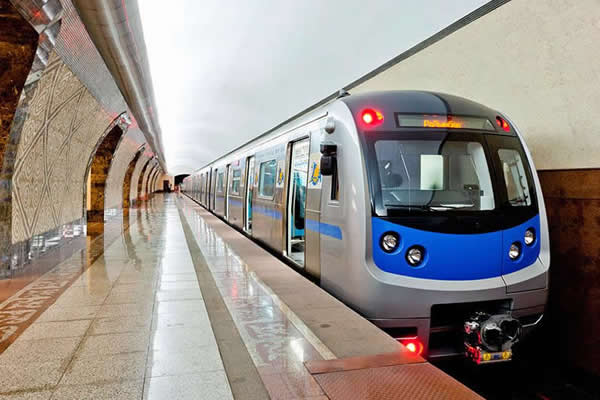
Recently, the Republic of Kazakhstan has been actively developing in its transport system improvement, because transport is an important sector of the economy and politics in Kazakhstan. First, this is due to its favorable geographical location, vast territory of Kazakhstan, low population density, settlements disbursement and remoteness, and dynamics of globalization and integration processes. Kazakhstan stands ninth in the ranks by the country area in the world, and in such circumstances, transport becomes the only way to overcome large distances between the regions, this applies to both the transportation of goods and movement of the people. The new railway lines are appearing and roads are being reconstructed. The country has no access to the seas and oceans other than the Caspian Sea, and as a result, the bulk of all the transportation falls on the land transportation. All the transportation is represented in the country: road, rail, water and air transport.
Due to the geographical specifics, railway and road transport are actively used in the country. Those transportation modes are not only convenient, but also a budget option for ordinary passengers.
A domestic railway industry has had a history of more than a century. Over the period, it has sustained and is keeping up with the fulfillment of important tasks of the state for the implementation of passenger and cargo transportation not only within the country, but abroad. The length of railways in Kazakhstan exceeds 16 thousand km.
A total highway network length of the Republic of Kazakhstan is 96 thousand km.
Today, all the regional cities of Kazakhstan have road connections with all the regional centers and settlements. The investment policy is aimed at modernization of the existing and construction of the new roads of international and local importance. Kazakhstan is implementing a large-scale project “New Silk Road”, which should revive the country’s role as a kind of bridge between Europe and Asia.
Automobile and urban electric transport is a transport category that includes all the transport by buses, trams, trolleybuses, other dry passenger transport, in particular, metro (in Almaty), freight road transport, as well as taxi services. This transport category services can be used in any city of Kazakhstan. Currently in the use of various taxi services, food delivery, and food products has been widely developed in Kazakhstan. Those service use their own mobile applications.
Air transport plays a major role in the transport system of Kazakhstan due to large geographical length of Kazakhstan.
In Kazakhstan there are 20 airports of republican and regional significance, of which 18 have served international transport. In total, during the years of independence, the reconstruction/construction of runways at 22 airports and the reconstruction/construction of passenger terminals at 16 airports were carried out. As part of the air transport infrastructure modernization, works are currently being carried out on 4 objects (the airports of Almaty, Shymkent, Kyzylorda, Kostanay cities).
The implementation of the above infrastructure projects will increase the capacity of passenger transportation, which in turn will provide the country’s residents with a higher level of comfort. As of 22.02.2024, there have 50 Kazakhstani operators operated.
Since 2012, the domestic air transportation market has been totally liberalized, that is, any Kazakh airline can operate flights on any domestic routes in accordance with the existing demand without restrictions. There have been 99 aircrafts of five (5) airlines (Air Astana group of companies (FlyArystan), SCAT, Qazaq Air, Uzhnoyr Nebo and Zhetysu) that provide regular transportation of passengers.
There are 630 flights per week on 51 domestic routes. An “open sky” policy has been introduced since 2017 to develop international passenger air transportation and new international routes have been launched on an annual basis. Today, international flights are proceeded to 28 countries on 108 air routes by four (4) domestic and 26 foreign airlines.
In 2023, flights were opened and resumed on 23 routes to 13 countries with a frequency of 62 flights per week (Lahore, Muscat, Manama, Delhi, Sharm el-Sheikh, Beijing, Xi’an, Urumqi, Samarkand, Baku, Tbilisi, Kutaisi, Bishkek, Ankara, Hangzhou, Jeddah).
It is planned to open flights in 2024-2025 to Bukhara, Fergana, Shanghai, Hong Kong, Guangzhou, Hainan, Sanya, Tokyo, Singapore, Riyadh, Larnaca, Brussels, Geneva, Vienna, Paris, Milan, Rome, New York. The Kazakhstan’s flight safety standards compliance level is 82%. This is the highest figure among the CIS countries, higher than the world average (at 15%) and the European average (at 5%).
Water transport. The seaports of Aktau, Kuryk and Bautino are located in the Kazakh sector of the Caspian Sea at the intersection of several international transport corridors.
The port infrastructure is a complex of terminal facilities with a throughput capacity of 21 million tons of cargo per year, consisting of:
- oil loading terminal with a design capacity of 7.5 million tons, providing transshipment of crude oil and petroleum products;
- grain terminals – 2 million tons, with simultaneous storage of up to 82.5 thousand tons of grain;
- dry cargo terminals – 3.5 million tons, intended for processing general, packaged and oversized cargo;
- universal terminal – 2 million tons;
- ferry complex – 6 million tons, capable of receiving road and rail ferries.
There are all types of access roads, technical equipment of the ports (gantry and mobile cranes, reloading equipment, etc.) allows loading and unloading of a wide range of dry, general, liquid, oversized (project) cargo, as well as roll-in/roll-out of wagon loads and freight vehicles funds. The operating seaports hours are year-round. The length of Kazakhstan’s inland waterways open to navigation is more than 4,000 km. Currently, river navigation is carried out along the navigable sections with a total length of 2104 km in Irtysh (Irtysh River including Lake Zaysan, Bukhtarminskoye, Ust-Kamenogorskoye and Shulbinskoye reservoirs), Ural-Caspian (Ural River, Ural-Caspian Canal and Kigach River (Kazakhstan part of the branch of the Volga River) and Ili-Balkhash (Kapchagai reservoir and Lake Balkhash) basins, as well as along Ishim River within Astana city.
Religion
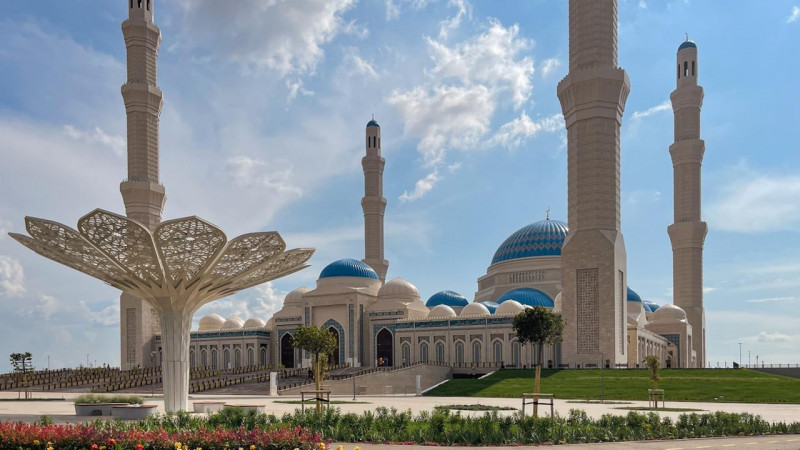
Modern Kazakhstan is a secular state. Kazakhstan has always been a place of contact between major world confessions. Provision of stability in society, revival and development of religious traditions in Kazakhstan is the result of a balanced and coordinated state policy aimed at ensuring freedom of religion, preserving social harmony and stability in society.
Despite the large number of different religions on the territory of Kazakhstan, majority of population is divided into Muslims who practice Sunni Islam and Christians who practice Russian Orthodox Christianity.
Network and communications
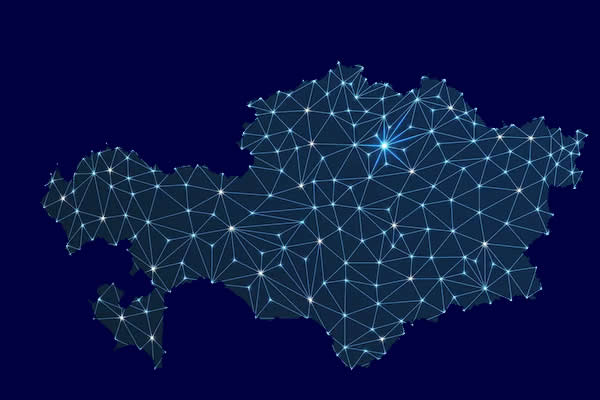
The telecommunications and communication sector of the Republic of Kazakhstan is represented by three areas: telecommunications, Internet and postal communications. Mobile operators are as follows: Kcell and Аctiv, Beeline, Tele2 and Altel. There are about 20 communication operators in the telecommunications market providing long-distance and international telephone services, Internet access and satellite mobile communications. Also there are 3 mobile communication operators.
Today, nobody has any doubts that digital technologies are an integral part of our lives, which results in accelerating its pace and making life easier for humanity. Particular emphasis is made to the development of digital industry in Kazakhstan. To develop the industry, the “Digital Kazakhstan” state program was adopted, which comprises a set of programs aimed at improving the standard of living of each resident of the country through application of digital technologies and provision of the population with ubiquitous access to the Internet.
Currently, two major projects are implemented in the country to ensure further provision of high-speed Internet to rural localities. Upon implementation of the projects, all rural localities with population of 250 people and more will get access to the broadband Internet.
To date, the “electronic government” state program had been implemented in Kazakhstan. Thanks to development of information technologies, government agencies operation became more efficient, in particular when it comes to delivery of public services to the population and business entities.
Postal communication is one of the physical channels for provision of access to information and financial services to the population of rural areas. There are 3448 post offices on the territory of the country.
Useful links:
Official website of the President of the Republic of Kazakhstan
Official website of the President of the Republic of Kazakhstan
Official website of the Prime-Minister of the Republic of Kazakhstan
Official website of the Parliament of the Republic of Kazakhstan
Official website of the RSI “Central Communications Service” under the President of the Republic of Kazakhstan (CCS)
Official website of the Embassy of the Republic of Kazakhstan to the Federative Republic of Brazil
https://www.gov.kz/memleket/entities/mfa-brazil?lang=en
Official website of THE WORLD NOMAD GAMES
Official website of The Ministry of Foreign Affairs of the Republic of Kazakhstan
https://www.gov.kz/memleket/entities/mfa?lang=en
Official website of the Ministry of Tourism and Sports of the Republic of Kazakhstan
https://www.gov.kz/memleket/entities/tsm?lang=en
Official website of the The Ministry of Culture and Information of the Republic of Kazakhstan
Embaixada do Cazaquistão no Brasil
__________________________________________________________________________________________________________________________________
Resumo semanal de notícias
2 a 7 de setembro de 2024
Eventos no Cazaquistão
O Presidente do Cazaquistão, Kassym-Jomart Tokayev, em sessão
conjunta das Câmaras do Parlamento, fez um pronunciamento ao povo
cazaque “Cazaquistão Justo: Lei e Ordem, Crescimento Econômico e
Otimismo Social” https://www.akorda.kz/ru/glava-gosudarstva-vystupil-
s-poslaniem-narodu-kazahstana-281550
O chefe de Estado recebeu o Ministro do Turismo e Esporte, Yerbol
Myrzabayssynov https://www.akorda.kz/ru/glava-gosudarstva-prinyal-
ministra-turizma-i-sporta-erbola-myrzabosynova-385643
O chefe de Estado recebeu o Presidente da Comissão Eleitoral Central,
Nurlan Abdirov https://www.akorda.kz/ru/glava-gosudarstva-prinyal-
predsedatelya-centralnoy-izbiratelnoy-komissii
O chefe de Estado realizou uma reunião para preparar os quintos Jogos
Mundiais Nômades https://www.akorda.kz/ru/glava-gosudarstva-provel-
soveshchanie-po-podgotovke-k-v-vsemirnym-igram
Em uma reunião do Governo, sob a liderança do Primeiro-Ministro
Olzhas Bektenov, foram examinadas medidas para implementar o
pronunciamento do chefe de Estado ao povo cazaque “Cazaquistão
Justo: Lei e Ordem, Crescimento Econômico e Otimismo Social” de 2 de setembro de 2024
https://primeminister.kz/ru/news/olzhas-bektenov-nash-glavnyy-prioritet-kachestvennaya-realizatsiya
O Cazaquistão realizará um referendo sobre a usina nuclear em outubro
https://astanatimes.com/2024/09/kazakhstan-to-hold-referendum-on-
nuclear-power-plant-in-october/
O Cazaquistão criará um Centro Nacional de Inteligência Artificial (IA)
na capital do país, Astana, até o próximo ano
https://astanatimes.com/2024/09/national-center-for-artificial-
intelligence-to-open-in-astana-announces-president/
O Presidente Tokayev destaca a importância do desenvolvimento da
energia nuclear https://astanatimes.com/2024/09/president-tokayev-hi
ghlights-importance-of-nuclear-energy-development/
O Presidente Tokayev prioriza o desenvolvimento do potencial industrial
e do setor de transporte do Cazaquistão
https://astanatimes.com/2024/09/president-tokayev-prioritizes-
developing-kazakhstans-industrial-potential-and-transport-sector/
A capital cazaque exibe obras raras surrealistas de Salvador Dali
https://astanatimes.com/2024/09/kazakh-capital-showcases-rare-
surrealist-masterpieces-by-salvador-dali/
Um futuro sustentável ao nosso alcance: Promessa da transformação
digital https://astanatimes.com/2024/09/sustainable-future-within-reach-
promise-of-digital-transformation/
A Tengizchevroil conclui a manutenção preventiva no campo de petróleo
de Tengiz https://astanatimes.com/2024/09/tengizchevroil-completes-
turnaround-maintenance-at-tengiz-oilfield/
A Federação Cinológica Internacional reconhece preliminarmente
o Tazy cazaque como raça de cachorro oficial
https://astanatimes.com/2024/09/international-canine-federation-
preliminarily-recognizes-kazakh-tazy-as-official-dog-breed/
Turistas Internacionais Mostram Interesse Crescente no
Cazaquistão Antes dos Jogos Mundiais Nômades
https://astanatimes.com/2024/09/intl-tourists-show-increasing-interest-
in-kazakhstan-ahead-of-world-nomad-games/
Cazaquistão no mundo
Kassym-Jomart Tokayev parabenizou o Presidente To Lam pelo
Dia da Independência da República Socialista do Vietnã
https://www.akorda.kz/ru/kasym-zhomart-tokaev-pozdravil-prezidenta-
to-lama-s-dnem-nezavisimosti
O chefe de Estado, Kassym-Jomart Tokayev, parabenizou o Presidente
do Brasil, Luiz Inácio Lula da Silva, pelo feriado nacional brasileiro, o Dia
da Independência https://www.akorda.kz/ru/glava-gosudarstva-
pozdravil-prezidenta-brazilii-s-nacionalnym-prazdnikom-785259
Kassym-Jomart Tokayev realizou uma reunião com o Diretor-Geral da
Organização Internacional do Trabalho, Gilbert Houngbo
https://www.akorda.kz/ru/kasym-zhomart-tokaev-provel-vstrechu-s-
generalnym-direktorom-mezhdunarodnoy-organizacii-truda
O chefe de Estado realizou uma reunião do Conselho de Administração
do Centro Financeiro Internacional “Astana”
https://www.akorda.kz/ru/glava-gosudarstva-provel-zasedanie-soveta-
po-upravleniyu-mezhdunarodnym-finansovym-centrom-astana-5881
O chefe de Estado recebeu o Presidente do Fundo de Desenvolvimento
da OPEP, Abdulhamid Al-Khalifa https://www.akorda.kz/ru/glava-
gosudarstva-prinyal-prezidenta-fonda-mezhdunarodnogo-razvitiya-
opek-abdulhamida-al-halifu-582613
Kassym-Jomart Tokayev recebeu o Presidente do Banco
Islâmico de Desenvolvimento, Muhammad Suleiman Al-Jasser
https://www.akorda.kz/ru/kasym-zhomart-tokaev-prinyal-prezidenta-
islamskogo-banka-razvitiya-muhammada-suleymana-al-dzhassera
Primeiro-ministro da República do Cazaquistão Olzhas Bektenov
participou da Conferência Ásia-Pacífico sobre inclusão e transformação
https://primeminister.kz/ru/news/olzhas-bektenov-prinyal-uchastie-v-
aziatsko-tikhookeanskoy-konferentsii
O chefe de Estado recebeu a lderança dos fundos do Grupo de
Coordenação Árabe https://www.akorda.kz/ru/glava-gosudarstva-
prinyal-rukovodstvo-fondov-arabskoy-koordinacionnoy-gruppy-584855
O Primeiro-Ministro do Cazaquistão, Olzhas Bektenov, realizou uma
reunião com o Presidente do Conselho de Administração do Banco de
Desenvolvimento da Eurásia, Nikolai Podguzov
https://primeminister.kz/ru/news/olzhas-bektenov-obsudil-s-glavoy
Um fórum de mesa redonda do Grupo de Coordenação Árabe (AGC) foi
realizado em Astana, que inclui o Banco Islâmico de Desenvolvimento,
o Fundo de Desenvolvimento Saudita, o Fundo de Desenvolvimento
Internacional da OPEP, o Fundo de Desenvolvimento Econômico do
Kuwait e o Fundo de Desenvolvimento de Abu Dhabi. O evento contou
com a participação do Vice-Primeiro-Ministro: Ministro da Economia
Nacional do Cazaquistão, Nurlan Baibazarov, o Presidente do Grupo do
Banco Islâmico de Desenvolvimento е Muhammad Suleiman Al-Jasser
https://primeminister.kz/ru/news/finansirovanie-proektov
O Vice-Primeiro-Ministro e Ministro das Relações Exteriores da
República do Cazaquistão, Murat Nurtleu, realizou uma reunião com o
Presidente do Fundo de Investimento Turco (TIF), Bagdat Amreyev
https://www.gov.kz/memleket/entities
O Vice-Primeiro-Ministro e Ministro das Relações Exteriores da
República do Cazaquistão, Murat Nurtleu, reuniu-se com o diretor-geral
da Organização Internacional do Trabalho (OIT), Gilbert Ungbo,
em sua primeira visita oficial ao Cazaquistão
https://www.gov.kz/memleket/entities/mfa/press/news/details/840518
O Vice-Primeiro-Ministro e Ministro das Relações Exteriores da
República do Cazaquistão, Murat Nurtleu, realizou uma reunião
com o presidente do Comitê Executivo do Fundo Internacional para
Salvar o Mar de Aral (IFAS), Askhat Orazbay
https://www.gov.kz/memleket/entities/mfa/press/news/details/840458
O Vice-Ministro das Relações Exteriores da República do Cazaquistão,
Alibek Bakayev, recebeu o Chefe da Missão Diplomática dos EUA no
Afeganistão, Karen Decker, o Embaixador dos EUA no Cazaquistão,
Daniel Rosenblum, e representantes da Agência dos
EUA para o Desenvolvimento Internacional (USAID)m
https://www.gov.kz/memleket/entities/mfa/press/
O Primeiro Vice-Ministro das Relações Exteriores da República do
Cazaquistão, Akan Rakhmetulin, recebeu o Embaixador do Brasil,
Rubem Corrêa Barboza, por ocasião do término de sua missão
diplomática https://www.gov.kz/memleket/entities/mfa/press/news/
O Primeiro Vice-Ministro das Relações Exteriores da República do
Cazaquistão, Akan Rakhmétulin, realizou uma reunião com o
Vice-Secretário-Geral da ONU e Secretário Executivo da
Comissão Econômica e Social das Nações Unidas para a
Ásia e o Pacífico (UNESCAP), Armida Alisjahbana
https://www.gov.kz/memleket/entities/mfa/press/news/details/
O vice-ministro de Relações Exteriores da República do Cazaquistão,
Roman Vasilenko, realizou uma cerimônia de premiação para os
vencedores do 9o concurso internacional anual “O
Cazaquistão aos olhos da mídia estrangeirа»
https://www.gov.kz/memleket/entities/mfa/press/news/details/841534
O Ministro da Energia do Cazaquistão fortalece laços com a China:
Foco em petróleo, gás e energias renováveis
https://astanatimes.com/2024/09/kazakh-energy-minister-strengthens-
ties-with-china-focus-on-oil-gas
Superando a Divisão Digital: Nações da Ásia-Pacífico se reúnem em
Astana https://astanatimes.com/2024/09/bridging-digital-divide-asia-
pacific-nations
O Cazaquistão e Banco Mundial lançam nova estratégia de parceria
https://astanatimes.com/2024/09/kazakhstan-world-bank-to-launch-
new-partnership-strategy
A Semana da Energia da Ásia Central e do Mar Cáspio de 2024 molda
o futuro verde da região https://astanatimes.com/2024/09/energy-week-
central-asia-and-caspian-2024-shapes-regions-green
Dias das Finanças de Astana: Transformando Pagamentos para
Impulsionar a Alfabetização Financeira e o Impacto Social
https://astanatimes.com/2024/09/astana-finance-days-transforming-
payments-to-boost-financial-literacy-and-social-impact/
A Atividade Empresarial do Cazaquistão Continua a Melhorar em Agosto
https://astanatimes.com/2024/09/kazakhstans-business-activity-
continues-to-improve-in-august/
Estrelas de Tecnologia Emergentes do Cazaquistão Apresentam
Soluções Inovadoras na Conferência da UNESCAP
https://astanatimes.com/2024/09/kazakhstans-rising-tech-stars-
present-innovative-solutions-at-unescap-conference/
Turistas Internacionais Mostram Interesse Crescente no
Cazaquistão Antes dos Jogos Mundiais Nômades
https://astanatimes.com/2024/09/intl-tourists-show-increasing-interest-
in-kazakhstan-ahead-of-world-nomad-games/
Embaixada do Cazaquistão no Brasil
E-mail: embassykz@gmail.com
kz.secretaria@gmail.com
